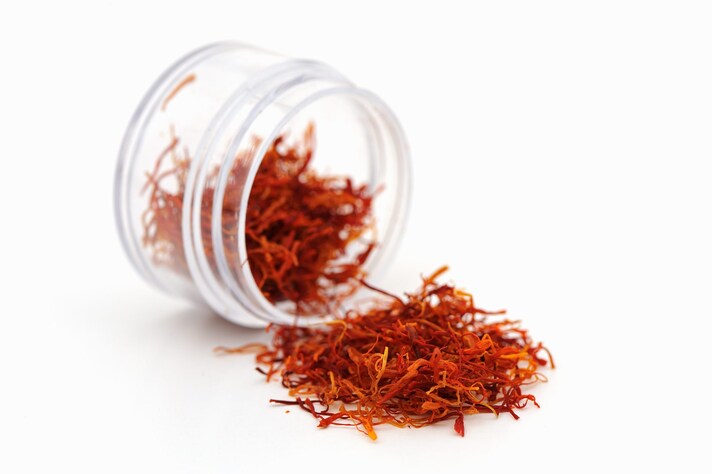11 Saffron Benefits
Beyond cooking, saffron has medicinal properties, and in ancient Greece, people would eat it to boost mood, enhance libido, and improve memory.
;)
Saffron is the most expensive spice in the world, so most of us use it very sparingly in cooking!
It costs so much because the harvesting method is labor-intensive, and it’s harvested by hand from the “saffron crocus”, Crocus sativus. The actual saffron is the flower’s stigma – the thread-like strands we use in the kitchen.
Beyond cooking, saffron has medicinal properties, and in ancient Greece, people would eat it to boost mood, enhance libido, and improve memory.
Read on to find out how you could benefit from having more saffron in your life!
1. It’s a Powerful Antioxidant

Saffron has a variety of plant compounds that are antioxidant in nature, which means they help protect your cells against oxidative stress and dangerous free radicals.
The antioxidants in saffron include crocin, crocetin, safranal and kaempferol.
Crocin and crocetin are carotenoid pigments, and it’s these that give saffron its color. These compounds may act as antidepressants, protect brain cells, fight inflammation and aid weight loss through reducing appetite.
Safranal is what gives saffron its taste and aroma, and research shows it may improve mood, memory and learning ability, as well as protecting the brain from oxidative stress.
Kaempferol is found in the saffron flower petals, and may help reduce inflammation, depression, and could have cancer fighting properties.
2. Could Improve Depressive Symptoms

Saffron is also known as “the sunshine spice”, and that’s not just because of its color. It could help boost your mood, and a review of five studies showed that saffron supplements were significantly more effective at treating symptoms of mild-to-moderate depression than placebos.
Some other studies found that taking 30mg of saffron a day was as effective as antidepressant drugs Fluoxetine, Imipramine and Citalopram. Fewer people suffered from side effects compared to the conventional treatments.
Longer human studies need to be done before saffron is proven to treat depression, but the outlook is promising.
3. May Fight Cancer

The antioxidants in saffron help neutralize free radicals, which have been linked to chronic illnesses, such as cancer.
In test-tube studies, saffron compounds have been shown to selectively kill colon cancer cells, or suppress their growth, while leaving healthy cells unharmed.
Other studies have found that crocin could make cancer cells more sensitive to chemotherapy drugs.
Although the test-tube studies are promising, more research needs to be done in human studies to draw a firm conclusion.
4. May Reduce PMS Symptoms

PMS is premenstrual syndrome, and it describes physical, emotional and psychological symptoms occurring in women before the start of a period.
One study showed that women who were between 20-45 years of age, and who took 30mg of saffron daily, found it more effective than a placebo at treating PMS symptoms like irritability, headaches, pain and cravings.
Another study showed that just smelling saffron for 20 minutes reduced PMS symptoms like anxiety, and lowered the levels of stress hormone cortisol.
5. Could be an Aphrodisiac

Aphrodisiacs are foods or substances that help boost libido and the desire for sex.
Men who suffered antidepressant-related erectile dysfunction were given 30 mg of saffron daily in one study, and they experienced significantly improved erectile function over four weeks, compared to those men taking a placebo.
Another study of women with reduced libido due to antidepressants was also given 30 mg of saffron daily over four weeks. They found that they experienced less sex-related pain, and also that their desire for sex, and lubrication, increased compared to a placebo.
6. May Reduce Appetite

Research suggests that saffron could reduce your appetite, which means that you are less likely to crave snacks between meals.
One eight week study of women taking saffron supplements showed that they felt fuller, ate snacks less frequently, and lost significantly more weight than the women in the placebo group.
Scientists are unsure how saffron works to curb appetite and assist weight loss, but it could be to do with mood elevation, which reduces your desire to eat snacks.
7. Could Reduce Heart Disease Risk Factors

Saffron’s antioxidant properties may lower blood cholesterol and stop arteries and blood vessels from clogging up, according to animal and test-tube studies.
8. May Lower Blood Sugar Levels

Mice with diabetes showed lower blood sugar levels and raised insulin sensitivity when given saffron.
9. May Improve Eyesight in Older People

Saffron seems to improve eyesight in people with age-related macular degeneration, and also to protect against damage by free radicals, which is linked with AMD.
10. Could Help Improve Memory in People with Alzheimer’s

The antioxidants in saffron could improve cognition in adults who suffer from Alzheimer’s disease.
11. Saffron is Easy to Add to Your Diet

Saffron goes well with savory dishes, such as paella, risottos and other rice dishes.
Draw out the unique flavor by soaking the saffron threads in hot (not boiling) water. Add the threads and the liquid to your recipe for a deeper, richer flavor.
You can buy saffron in thread or powder form, but the threads are more versatile, and you know that they are pure saffron, whereas the powder form may have other ingredients added to it.
A small amount goes a long way with saffron, and you often don’t need more than a small pinch in your recipes. You can also buy saffron in supplement form, too.
;Resize,width=767;)
;Resize,width=712;)
;Resize,width=712;)
;Resize,width=712;)
